AI Technical Support Specialists are the backbone of maintaining and enhancing the performance of AI-driven systems. They ensure smooth operations by tackling system issues, providing technical solutions, and supporting end-users in utilizing AI technologies effectively.
Key skills for this role include a solid understanding of AI frameworks, strong analytical abilities, and excellent communication skills to articulate technical information clearly to both technical and non-technical users.
Candidates can write these abilities in their resumes, but you can’t verify them without on-the-job AI Technical Support Specialist skill tests.
In this post, we will explore 8 essential AI Technical Support Specialist skills, 7 secondary skills and how to assess them so you can make informed hiring decisions.
Table of contents
8 fundamental AI Technical Support Specialist skills and traits
The best skills for AI Technical Support Specialists include Technical Troubleshooting, AI System Knowledge, Programming Skills, Data Analysis, Problem-Solving Aptitude, Customer Support, Documentation Proficiency and Cybersecurity Awareness.
Let’s dive into the details by examining the 8 essential skills of a AI Technical Support Specialist.
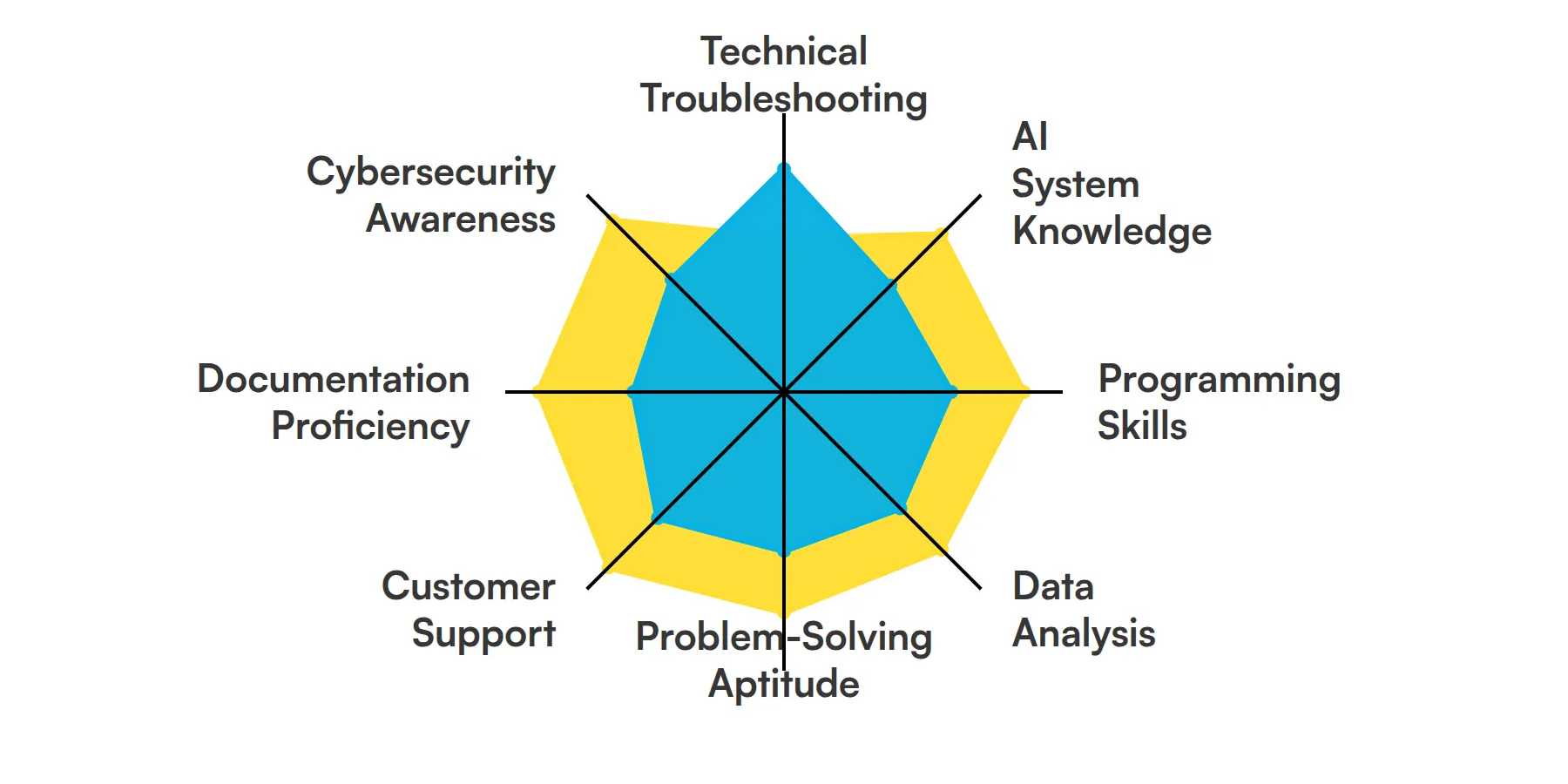
Technical Troubleshooting
Technical troubleshooting is a core function for an AI Technical Support Specialist. This involves diagnosing, analyzing, and resolving issues with AI systems and applications. You'll often find yourself deep in log files, system diagnostics, and error messages to find the root cause of a problem and ensure smooth operation of AI technologies.
For more insights, check out our guide to writing a AI Technical Support Specialist Job Description.
AI System Knowledge
Understanding the fundamentals of AI systems and technologies is paramount. As an AI Technical Support Specialist, you should be well-versed in the workings of machine learning models, neural networks, and natural language processing. This aids in applying the right solutions efficiently and explaining AI functionalities to non-technical users.
Programming Skills
Proficiency in programming languages like Python and R is essential for creating scripts, automating tasks, and sometimes modifying AI models or systems. This skill enables you to handle common coding tasks and fixes that an AI Technical Support Specialist encounters regularly.
Check out our guide for a comprehensive list of interview questions.
Data Analysis
AI Technical Support Specialists need to understand and work with data. Skills in data analysis help in interpreting AI outputs, validating data integrity, and ensuring AI models function correctly. You will use tools like SQL or Excel to manipulate datasets effectively.
Problem-Solving Aptitude
A natural inclination toward solving puzzles or troubleshooting technical issues is key. The ability to approach problems methodically and creatively allows an AI Technical Support Specialist to find innovative solutions to complex technical issues in AI systems.
Customer Support
While technical expertise is critical, excellent customer support skills are also necessary. As an AI Technical Support Specialist, you must communicate effectively with clients, understand their concerns, and guide them through solutions patiently and clearly.
For more insights, check out our guide to writing a Customer Service Job Description.
Documentation Proficiency
Creating and maintaining accurate technical documentation and user guides are part of the job. Documentation proficiency ensures that both the support team and clients have clear, helpful resources to resolve future issues based on past solutions.
Cybersecurity Awareness
Being aware of cybersecurity practices is important to maintain the integrity and confidentiality of data handled within AI systems. An AI Technical Support Specialist should help enforce these practices, recognizing potential security threats and vulnerabilities.
Check out our guide for a comprehensive list of interview questions.
7 secondary AI Technical Support Specialist skills and traits
The best skills for AI Technical Support Specialists include API Management, Version Control, Project Management, Technical Writing, Cloud Computing, Networking Basics and Cross-Platform Support.
Let’s dive into the details by examining the 7 secondary skills of a AI Technical Support Specialist.
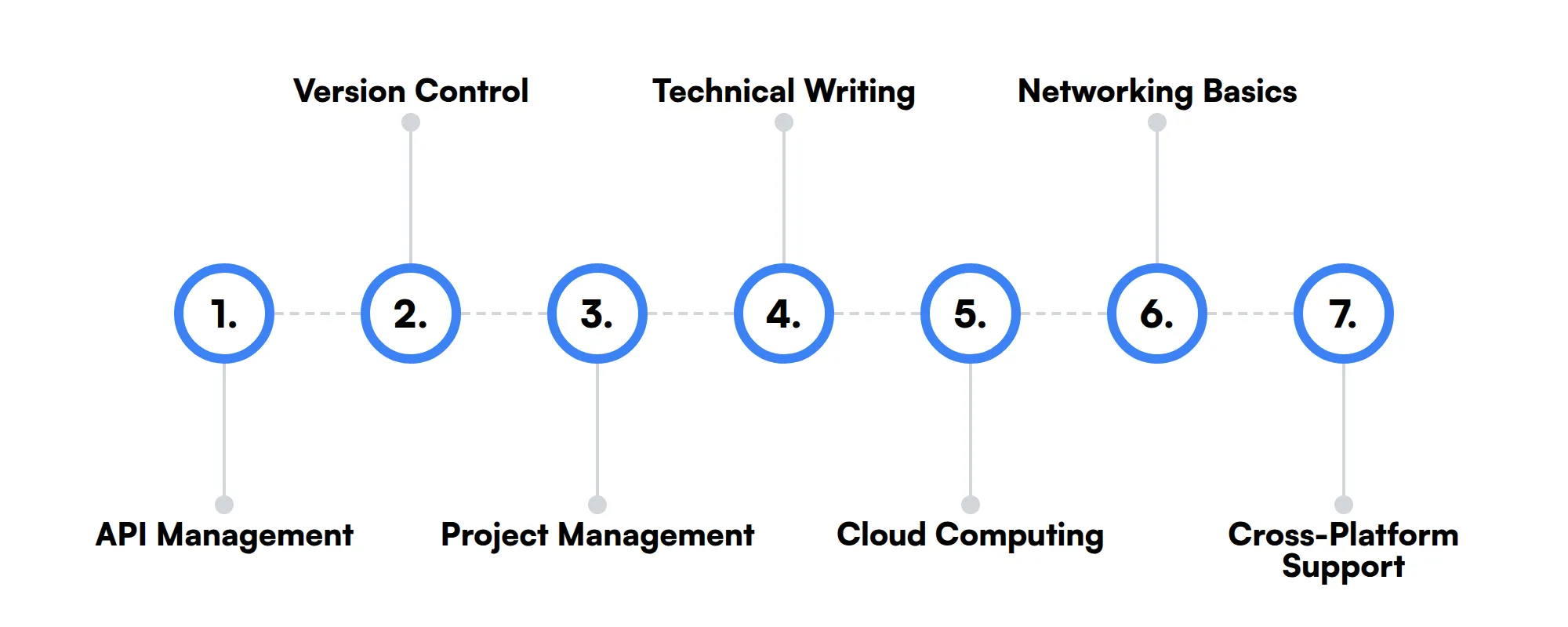
API Management
Understanding how to manage and troubleshoot APIs is important as many AI services interact through API calls. Knowing how to work with REST APIs can aid in resolving connectivity and integration issues.
Version Control
Familiarity with version control systems like Git is useful for collaborating on code and managing changes effectively. This skill helps track modifications and resolve conflicts in code development.
Project Management
Basic project management skills can help in prioritizing tasks and ensuring that project timelines are met. This skill is beneficial when dealing with time-sensitive support issues.
Technical Writing
Clear and concise technical writing aids in creating user guides, FAQs, and training materials that are essential for self-help resources. Being able to convey technical information in an accessible manner is vital for effective communication.
Cloud Computing
Knowledge of cloud service providers like AWS, Azure, or Google Cloud is increasingly necessary. Many AI solutions run in the cloud, and understanding these environments aids in troubleshooting cloud-based issues.
Networking Basics
Understanding basic networking concepts can be helpful since many AI applications depend on network connectivity. This skill aids in diagnosing and resolving network-related issues affecting AI services.
Cross-Platform Support
Experience with supporting AI applications across different operating systems and devices enhances your ability to debug and provide support in diverse client environments.
How to assess AI Technical Support Specialist skills and traits
Assessing the skills of an AI Technical Support Specialist goes beyond what a resume can capture. The role requires a versatile set of abilities, including technical troubleshooting and customer support, all while navigating the intricate landscape of AI systems. Resumes might highlight specific experiences or educational backgrounds, but they often fall short in measuring practical proficiency and how well a candidate meets the demands of your organization.
Implementing skills-based hiring practices, such as conducting talent assessments, provides a more accurate gauge of a candidate's abilities. By employing assessments, you can evaluate not only programming skills or data analysis prowess but also the candidate's problem-solving aptitude and documentation proficiency. Skills-based assessments can reveal whether potential hires possess the necessary blend of technical and interpersonal skills.
Adaface assessment tests offer a comprehensive solution to streamline the hiring process. These tests help reduce screening time by 85%, allowing you to focus on selecting candidates with the right mix of skills and traits required for your AI Technical Support Specialist role. Tailoring tests to reflect your organization’s unique needs ensures that you are poised to find the best fit for your team.
Let’s look at how to assess AI Technical Support Specialist skills with these 6 talent assessments.
Technical Support Test
The Technical Support Test checks the understanding of IT infrastructure, troubleshooting, and communication skills necessary for technical support roles.
This test covers key areas such as Operating System Fundamentals, Networking Concepts, and Problem-Solving and Critical Thinking. It also evaluates the candidate's handling of IT Service Protocols, Cybersecurity Principles, and Incident Reporting.
High-scoring candidates demonstrate proficiency in managing Data Backup and Recovery Procedures, handling ITIL Processes, and using Scripting Languages like Python and Bash for troubleshooting.
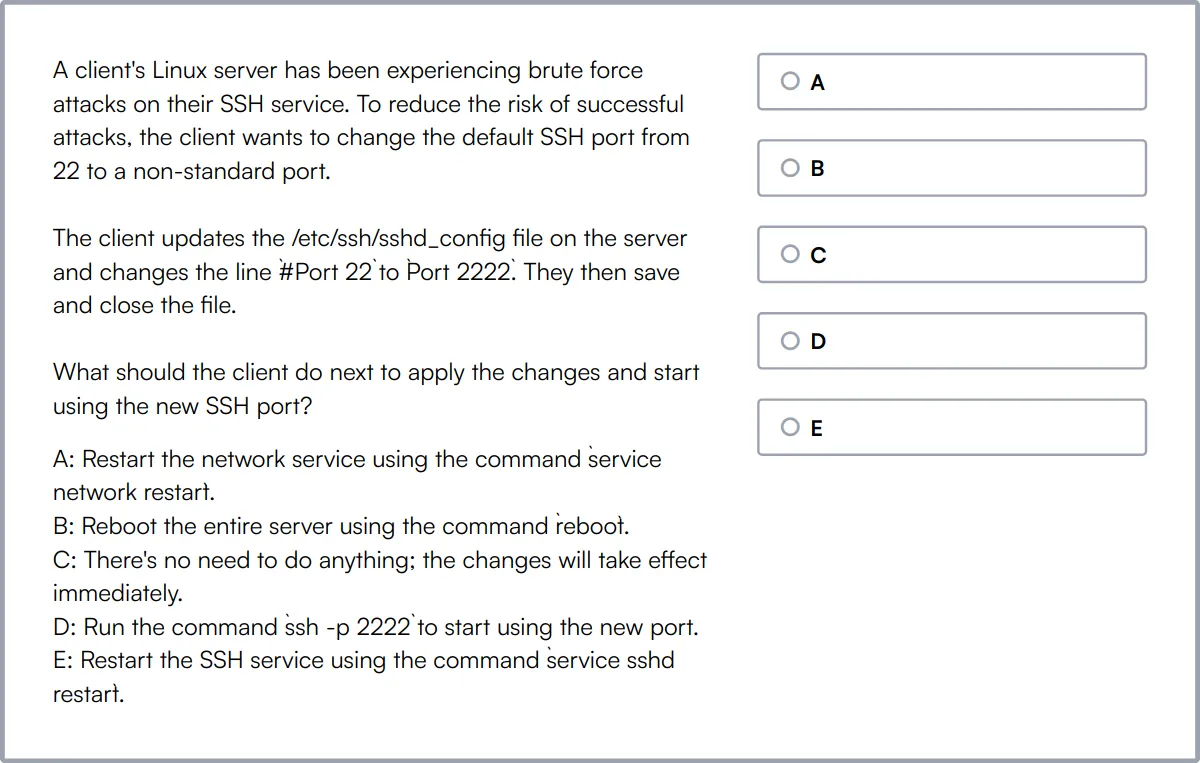
AI Technical Support Specialist Test
The AI Technical Support Specialist Test evaluates a candidate's capability in providing tech support in AI-centric environments, assessing both AI knowledge and customer service skills.
Key areas include Technical Support Fundamentals, Basics of Artificial Intelligence, and Communication Skills. The test includes scenario-based MCQs to gauge Situational Judgment, Troubleshooting Techniques, and competency with AI Tools and Platforms.
Candidates who score well show adeptness in Data Analysis and Management, familiarity with Remote Support Systems, and the ability to navigate Software and Hardware challenges in AI-driven contexts.
Basic Computer Skills Test
The Basic Computer Skills Test measures foundational computer knowledge necessary across various domains, including data entry, typing, and basic system administration.
It covers essential skills such as Data Entry, Excel Proficiency, and System Administration. The candidate's ability to handle Basic Computer Operations and engage in tasks requiring Typing and Shell Scripting is also evaluated.
Candidates with high scores display fluency in fundamental Computer Skills and are capable of executing tasks across sectors that require Basic Technology Competence.
Data Analysis Test
The Data Analysis Test checks a candidate's aptitude for handling and interpreting data, a key skill in roles requiring data-driven decision-making.
The test assesses abilities in Data Modelling and Data Interpretation, covering skills such as SQL Queries, Data Queries and Databases, and analyzing Charts and Graphs. It includes scenario-based questions to evaluate competency in utilizing Popular Data Tools.
Successful candidates demonstrate strong skills in Data Operations and the ability to derive insights through Business Analysis Fundamentals.

Problem Solving Test
The Problem Solving Test evaluates a candidate's ability to navigate complex problems through a range of logical and reasoning skills.
It engages candidates in questions designed to assess Abstract Reasoning, Critical Thinking, and Deductive and Inductive Reasoning. The test also includes Pattern Matching and Spatial Reasoning challenges.
High-performing candidates not only demonstrate cognitive flexibility but also exhibit strong Learning Agility and are adept at responding to novel situations.
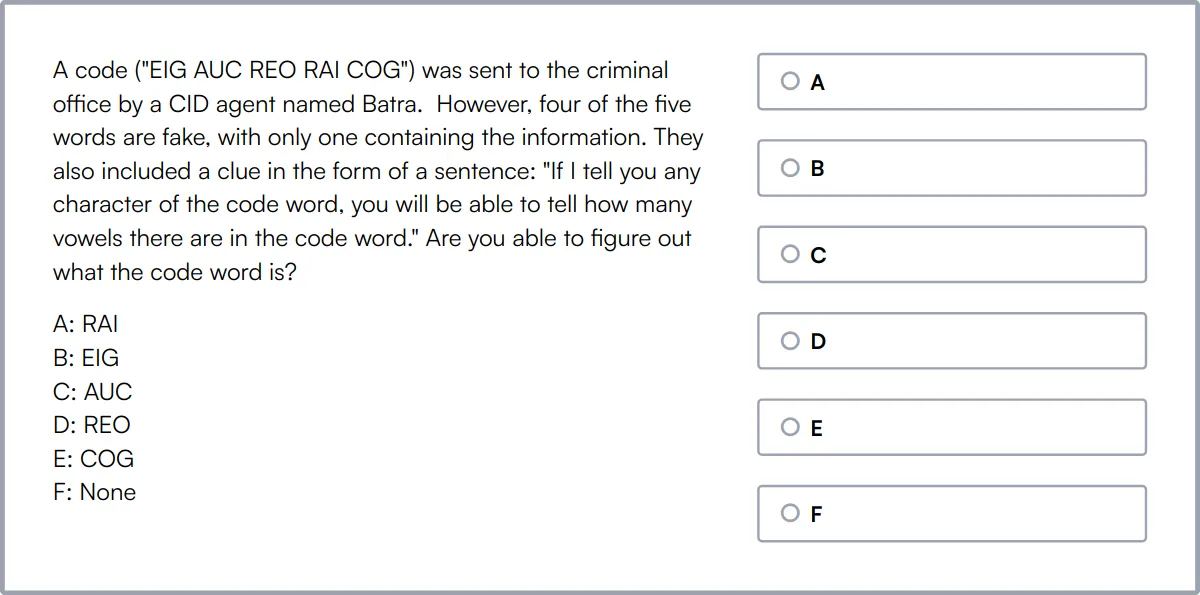
Customer Service Test
The Customer Service Test evaluates skills that are crucial for maintaining superior customer interactions and resolving issues professionally.
This test assesses Communication and Customer Service Skills through scenarios designed to test Empathy, Conflict Resolution, and Problem-Solving. It also evaluates how well a candidate can manage time and pay attention to detail.
Candidates who score highly show not only proficiency in managing Customer Interactions but also excel in Product Knowledge and the ability to provide nuanced solutions.
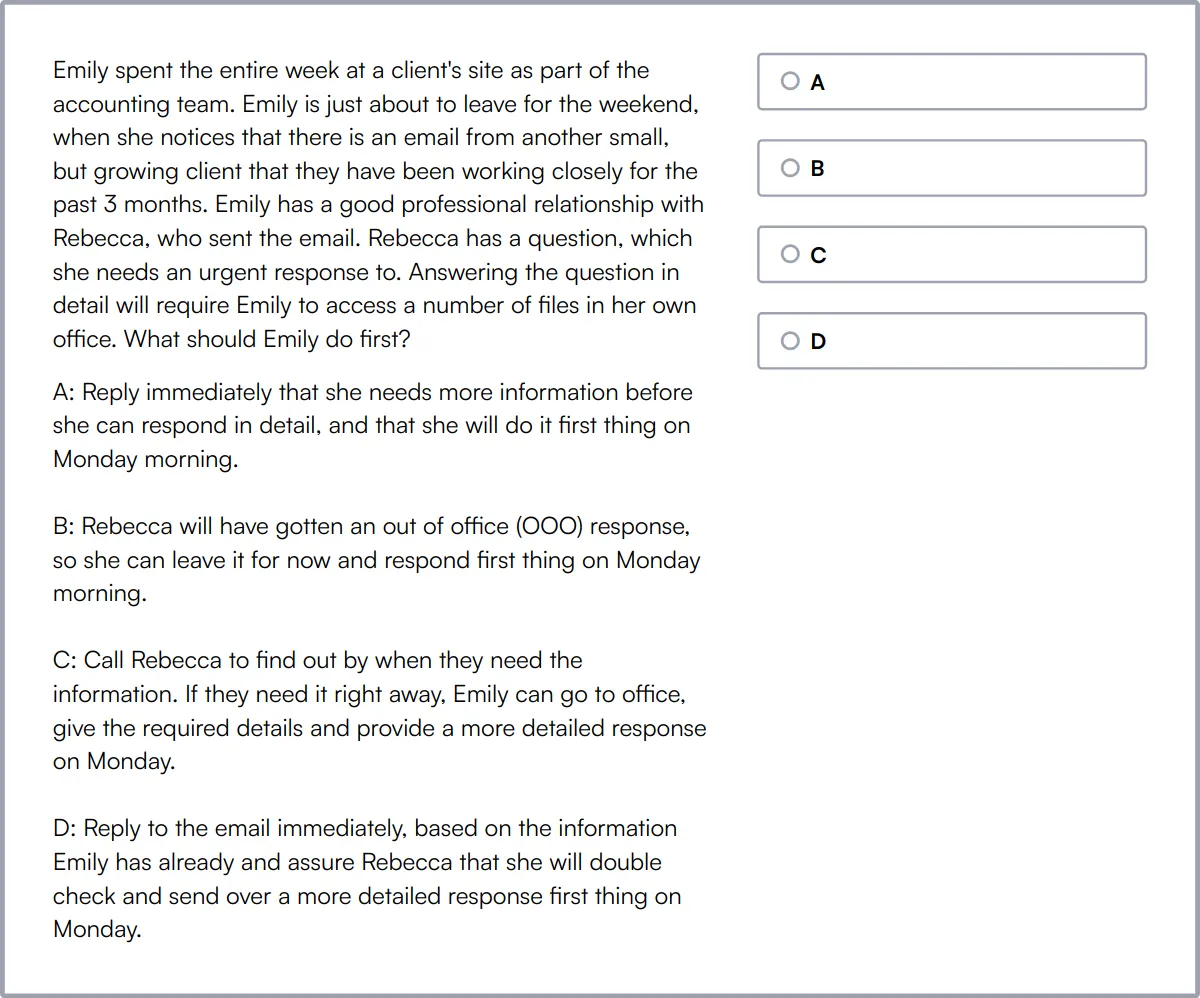
Summary: The 8 key AI Technical Support Specialist skills and how to test for them
| AI Technical Support Specialist skill | How to assess them |
|---|---|
| 1. Technical Troubleshooting | Evaluate how swiftly a candidate identifies and resolves technical issues. |
| 2. AI System Knowledge | Assess understanding of AI systems and their practical applications. |
| 3. Programming Skills | Test proficiency in relevant programming languages for AI tools. |
| 4. Data Analysis | Judge ability to interpret and manipulate data sets effectively. |
| 5. Problem-Solving Aptitude | Determine competence in devising solutions for complex challenges. |
| 6. Customer Support | Examine how well the candidate handles customer queries and feedback. |
| 7. Documentation Proficiency | Review clarity and detail in technical documentation creation. |
| 8. Cybersecurity Awareness | Check understanding of basic practices to protect data and systems. |
AI Technical Support Specialist Test
AI Technical Support Specialist skills FAQs
What skills are essential for an AI Technical Support Specialist?
AI Technical Support Specialists need skills like technical troubleshooting, AI system knowledge, programming, and customer support. Familiarity with data analysis, cybersecurity awareness, and networking basics is also important.
How can recruiters assess technical troubleshooting skills?
Recruiters can use practical scenarios or technical problem-solving tasks to evaluate a candidate's ability to diagnose and resolve technical issues effectively.
Why is AI system knowledge important in technical support?
AI system knowledge helps specialists understand the AI technologies in use, allowing them to address issues, optimize performance, and assist customers with technical inquiries.
What programming skills are valuable for this role?
Proficiency in languages like Python, Java, or R is useful. Understanding version control systems like Git is also beneficial for managing software changes and collaborative work.
How do you evaluate data analysis skills in candidates?
Provide candidates with datasets and task them with identifying patterns or making data-driven recommendations. This assesses their analytical thinking and technical proficiency.
Why is documentation proficiency important?
Good documentation proficiency ensures clear, accurate communication of technical processes and solutions, aiding both internal teams and end-users in understanding procedures and protocols.
What role does cybersecurity awareness play in AI support?
Cybersecurity awareness helps in protecting sensitive data and AI models from vulnerabilities and threats, ensuring safe and secure operation of AI systems.
How does project management contribute to the effectiveness of AI Technical Support Specialists?
Project management skills aid in organizing technical support tasks, prioritizing issues, and ensuring timely resolution, contributing to smoother operation and customer satisfaction.

40 min skill tests.
No trick questions.
Accurate shortlisting.
We make it easy for you to find the best candidates in your pipeline with a 40 min skills test.
Try for freeRelated posts
Free resources



